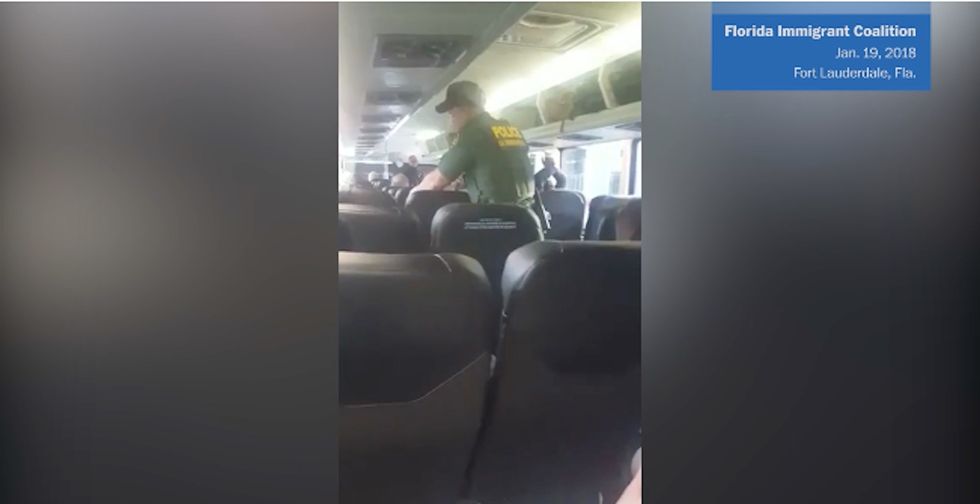
Border Patrol agents ask passengers aboard a Florida bus to display their IDs. (Image source: Washington Post video screenshot)

Count me among the people who are glad that immigration laws are being enforced with greater zeal over the last year.
Although I have some quibbles with the immigration system that I would like to see Congress address, I think it's dangerous for a society — or certain segments of it — to refuse enforcement of a duly-enacted criminal law. To do so promotes disrespect for the rule of law itself, unconstitutionally relieves legislators of the burden of actually doing their jobs, and encourages other forms of lawbreaking.
In the same manner, I think that states should absolutely be free to set their own marijuana policy, and polls suggest that a vast majority of the country agrees with that view.
It's kind of jarring in this day and age that marijuana is still a Schedule 1 substance, but the proper answer to this issue is to force members of Congress to own the political repercussions of their action (or lack of action) by actually voting on a bill to remove marijuana from Schedule 1.
It's perfectly fine for Sen. Cory Gardner (R-Colo.) to rant about Attorney General Jeff Sessions' decision to actually enforce federal law. I have the crazy idea, however, that instead of placing holds on DOJ nominees, he would be better served to, you know, introduce a bill decriminalizing marijuana on the federal level.
This is, after all, what I was told in my high school civics class that representatives and senators were supposed to do with their time.
Similarly, whether you like or dislike U.S. immigration policy, as currently written, it turns out that we have an actual procedure in place for setting immigration policy. According to the Constitution — which has worked pretty well as a governing document so far — the power to establish a "uniform rule of Naturalization" lies exclusively with Congress.
Immigration policy, as a uniquely federal responsibility that pertains directly to issues of natural sovereignty, is both logically and constitutionally a matter that should be decided by the people's elected federal representatives.
States should not be free to flaunt federal policy in this unquestionably federal sphere, and no chief executive should unilaterally declare — as former President Barack Obama did — that the law will not be enforced with respect to certain classes of lawbreakers. The president is constitutionally charged with faithfully executing the law, not just the laws he likes.
But in just the same way that there is a constitutional process to change immigration law, there are also constitutional limits to the exercise of law enforcement's authority that are often flaunted in the pursuit of worthy objectives.
Specifically, the requirement that searches of "persons" and their belongings conducted by law enforcement must be "reasonable," which generally speaking means supported by either a) a warrant or b) probable cause. "Probable cause" is a subject about which millions of words have been written in various Supreme Court and appellate judicial decisions, but a central cornerstone of our understanding is that police have to have an actual reason, based on legally obtained evidence (as opposed to just a hunch) to believe that evidence of criminal wrongdoing will be found on a given person or in a given place before they can search it.
In light of these principles, videos like this one, which surfaced late last week, ought to trouble us all:
It is one thing if police have reason to believe – again, based on legally obtained evidence – that a given illegal immigrant is traveling on a bus. In such a case, if immigration enforcement wants to board a bus and ask the person in question to verify their right to be in this country legally, they should be encouraged to do so. It is another thing entirely for them to board a bus and indiscriminately demand IDs from all and sundry aboard, based apparently on nothing more than the fact that illegal immigrants sometimes ride buses.
Regardless of the legal niceties here, it ought to be galling to us all that merely availing oneself of a privately owned bus company, without more, is apparently enough to allow agents of the state to climb aboard, demand identification, and rifle through a person's belongings. We ought not be comfortable seeing it in America.
Whether you personally would feel inconvenienced or affronted by being asked to show your ID in this scenario is beside the point: There must be a line past which police are not allowed to tread into the lives of citizens who are not engaged in obvious lawbreaking, or we don't have a free society.
And if that line isn't crossed when police just board a bus for no apparent reason and start demanding IDs and looking through belongings, then I don't know when it possibly would be.
By all means, Border Patrol agents and other immigration enforcement officers should aggressively enforce our immigration laws. But we should require them to have actual reasons to stop people who are moving about this country and search them, as opposed to just hunches and indiscriminate spot checks. The more the approach to law enforcement is encouraged and permitted, the more we all face greater threats to our personal freedom down the road.
Video courtesy of the Washington Post.